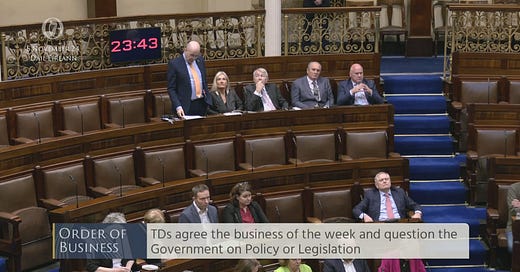Countries most vulnerable to climate change face not only devastating floods and other disasters but also crippling debt. These financial burdens are nearly impossible to escape, leaving little room to address the pressing needs of their populations. Without significant debt relief, these countries will struggle to provide basic services, let alone tackle climate change. However, this will never make it onto the international debt agenda without targeted support from nations like Ireland, through institutions such as the International Monetary Fund (IMF). Thoughtfully designed assistance could ensure climate mitigation and adaptation are prioritised in global aid efforts.
This was the basis of my final intervention in Parliament as an MP, with Ireland’s Prime Minister, An Taoiseach, Simon Harris TD.
The Dual Crisis: Debt and Climate Change
The reality is that the COVID pandemic exacerbated the economic challenges faced by lower-middle-income countries, pushing an additional 100 million people into extreme poverty. The ongoing war in Ukraine has further increased global economic uncertainty, adversely affecting trade and investment flows. These disruptions have led to high food and energy prices, compounding the impacts of climate change. As a result, these countries are experiencing weakened economic growth and ballooning debt burdens.
The Case for Debt-for-Climate Swaps
One proposed solution is debt-for-climate swaps, where debt is reduced in exchange for commitments to environmental action. This approach offers a pathway to address both economic and ecological crises, giving vulnerable countries a fair chance to adapt to a changing world. Previously in Parliament I have highlighted the Ubuntu initiative, which is supported by young parliamentarians from Egypt, Ghana, Indonesia, and Senegal. The Ubuntu initiative advocates for such swaps with a special focus on adaptation. This measure would provide debt relief while spurring climate action, allowing countries to build resilient economies and societies.This measure would provide debt relief while spurring climate action, allowing countries to build resilient economies and societies.
The Role of the IMF
The International Monetary Fund (IMF) plays a crucial role in this context. By developing a debt swap for climate action strategy, the IMF can help lower-middle-income countries restore debt sustainability and mobilise resources for climate change mitigation and adaptation. While I welcome the changes as of last Friday to the IMF's surcharge policy, this policy still adds additional charges on top of basic interest rates and places an unfair burden on vulnerable countries. Suspending and eventually eliminating these surcharges would alleviate debt pressures and support a smooth transition to a green economy.
Conclusion
I welcome the fact that An Taoiseach has committed to having the Minister for Finance engage with me on this important topic. The reality is that this debt is stifling innovation and opportunity in vulnerable countries, forcing their best people to seek better lives elsewhere. By adopting innovative measures like debt-for-climate swaps, we can support sustainable investment and drive the green economy in these countries. This approach not only addresses the immediate economic challenges but also contributes to global climate and sustainability goals. It is time for the IMF and the international community to take bold action and ensure that no country is left behind in the fight against climate change.









Share this post